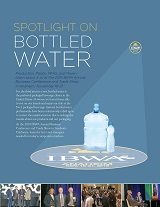Alexandria, VA – The International Bottled Water Association (IBWA) today issued the following statement in response to Governor Martin O’Malley’s adoption of guidelines restricting the use of state funds to purchase bottled water. The recommendations were drafted by the Maryland Green Purchasing Committee, created and tasked by the legislature with “greening” state spending.
“The recent announcement by Governor O’Malley endorsing the restriction of access to bottled water by Maryland state employees is disappointing. However, the action wisely allows bottled water to continue to be used by state facilities when tap water is not available, as well as in vending machines.
Both tap water and bottled water have a role to play in making it possible and convenient for people to drink more water, which is a very healthful beverage choice. Nonetheless, it is unfortunate that the state has opted to single out healthy, safe and zero calorie bottled water.
Bottled water is comprehensively regulated by the U.S. Food and Drug Administration (FDA) and the Maryland Department of Health and Mental Hygiene as a packaged food product. By law, the FDA must regulate bottled water at least as stringently as the Environmental Protection Agency regulates tap water.
Removing bottled water as an option does not automatically drive people to drink tap water. According to peer-reviewed consumer research, and demonstrated through testing in Toronto, Canada schools, if bottled water is not available, only one-third of people seek out tap water, while two-thirds instead choose packaged beverages that add calories or sugar, or both, to their diet.
The importance of drinking water, including bottled water, is vital to maintaining a healthy lifestyle, especially for the 64 percent of Marylanders who are either obese or overweight. The U.S. Department of Agriculture’s Choose My Plate program, which encourages healthy eating, recommends drinking water instead of sugary drinks and First Lady Michelle Obama’s Let’s Move campaign urges children to opt for water when they are thirsty.
When it comes to the environment, bottled water companies are reducing their environmental foot print by light-weighting their products and developing new technologies in product packaging, such as the use of recycled content, biodegradable and compostable materials. Many companies are also utilizing more fuel efficient means of transportation.
Bottled water containers are 100% recyclable and recycling rates have doubled in the past five years.
Banning the purchase of bottled water by state government agencies also negatively impacts real people and the economy. The bottled water industry provides and supports 2,260 jobs in the state, resulting in $92 million in wages and benefits for Maryland workers. The bottled water industry is also responsible for as much as $1.1 billion in total economic activity in Maryland in 2009.
The bottled water industry is always at the forefront of relief efforts during natural disasters, boil alerts, and other catastrophic events to deliver clean, safe drinking water. Most recently, the industry was able to respond when two Maryland state agencies called for emergency water donations in the aftermath of Hurricane Irene. However, the bottled water industry relies on a viable commercial market and cannot exist only for disaster response. To discourage the use of bottled water does a disservice to an industry that is called upon every year to provide much needed safe, clean, drinking water.”
# # #



























